Back Bay Mission’s Overnight Shelter Prototype Brings Innovation to Transitional Housing
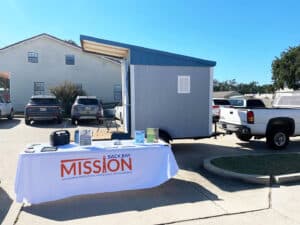
Back Bay Mission in Biloxi, Miss., is the UCC’s primary presence on the Gulf Coast. Its many outreach programs help to transform the lives of countless people, including those who find assistance while living in area homeless camps and who visit Back Bay’s Micah Day Center. But now, with the help of partners, Back Bay is looking to extend its outreach by opening the area’s first overnight low barrier homeless shelter. And the vehicle for such a shelter may be a new model for helping people who are homeless get back on their feet: an emergency shelter on wheels.
Back Bay’s proposal is to provide a parking lot filled with tiny houses on wheels. Each single story tiny house would provide a safe refuge from the extreme high temperatures of Biloxi and provide a comfortable space to get a good night’s sleep.
The houses would be available to anyone who is homeless. “Low barrier” shelters are those in which people don’t have to be free from addiction to stay at the shelter. They can bring their children, pets, and belongings. As Back Bay Executive Director James Pennington recently told WXXV News 25 in Biloxi, “The goal … is sustainability and to meet them where they’re at. If they have mental health issues, to make sure they’re getting the medication they need, the therapy they need.”
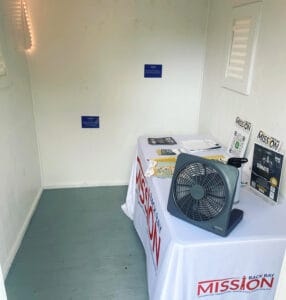
To create support for the concept, Back Bay recently completed a “Tiny Bedroom Tour” in South Mississippi that included a Town Hall meeting on homelessness. Throughout October and the first part of November, Back Bay staff and volunteers parked an emergency shelter on wheels prototype at various community events. The prototype is 6 feet by 8 feet with a small patio in front. At each of the locations, attendees could tour the prototype, ask questions, and learn more about both Back Bay and its work to help eliminate homelessness.
“The prototype was available for all to see, feel, and walk inside so they could better understand what we’re hoping to achieve,” said Dhiana Skrmetti, Back Bay’s development director. “The tour went amazingly well. We had various individuals and families walk inside the shelter, ask questions on our mission, and learn what we’re trying to accomplish.”
Partnerships Lay Groundwork
The prototype on display in the community was built thanks to a special partnership between Back Bay, Gulfport High School, and the Biloxi branch of Harbor Freight Tools.
“Back Bay Mission was already raising funds when, by chance, a volunteer met a Gulfport High STEM instructor at lunch after church one Sunday,” said Kevin Kotula, development associate at Back Bay. “As the two were talking, the idea of the ‘Emergency Shelter on Wheels’ came up and was a perfect fit! The STEM students at Gulfport High won a grant from Harbor Freight so they could start a project that would help end homelessness.”
Kotula said that Back Bay then sent over their plans, designed by a long-time Back Bay volunteer who is an architect. The STEM student then built the prototype.
“We are so proud and honored to have partnered with Gulfport High School for such an important project, and are thankful to have a group of students be so engaged in making a change in their community,” Kotula said. “We also are thankful for Harbor Freight’s generous support.”
Changing Hearts and Minds
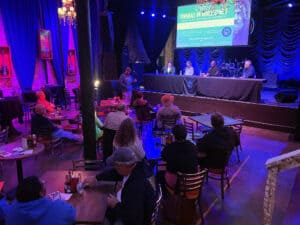
In conjunction with the tour, on Nov. 14, 2023, Back Bay held the Town Hall on homelessness. The gathering included a panel discussion that featured Pennington; John Miller, chief of the Biloxi Police Department; Councilman Felix Gines, City of Biloxi, Ward 3; Kay Denault, executive director of the Mental Health Association; and Alix Dearing, director of coastal operations for Pine Belt Mental Health.
“The audience was engaged, thoughtful, and provided thorough feedback on how South Mississippi leaders can move forward with supporting the homeless community on the Gulf Coast,” said Skrmetti. “The group had a spirited, honest, and healthy discussion surrounding mental health and the role it plays in being unsheltered.”
Another key topic, said Skrmetti, was that of creating sustainable housing options — both transitional and permanent. “The crowd was largely in favor of doing whatever is necessary to begin the process of establishing more options for transitional housing, including building a small community based on our tiny emergency shelter on wheels prototype,” Skrmetti said.
Any naysayers at the Town Hall were quelled by the presence of a mission group of volunteers from North Community UCC in Marshfield Hills, Mass., who happened to be working at Back Bay the week of the Town Hall. Group members participated in the discussion, and their words and presence helped further Back Bay’s position that the shelter is needed.
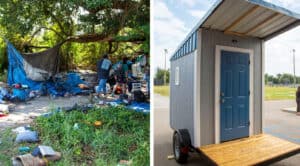
“A key statement that our local leaders love to say is that Biloxi is a tourist destination,” said Skrmetti, possibly alluding to not wanting to deal with homelessness. “Some of our mission campers shared that they themselves were tourists. Their encouragement of a shelter played right into Biloxi’s narrative of being ‘aesthetically pleasing,’ because a tiny shelter would remove trash that typically found in the area around a homeless camp.”
Looking Ahead
As in many communities, there has been a fear of homeless people among some Biloxi residents, and a sentiment of “not in my backyard” regarding transitional shelters. But Back Bay staff believes the court of public opinion has shifted regarding homelessness, with many people now feeling that the community must address homelessness on a large scale.
During the tour and Town Hall, those in attendance were surprised at the number of people Back Bay serves each month. For example, Skrmetti said that Back Bay’s food pantry alone was serving 250 individuals and families a month in early 2023. That number is now 550 each month.
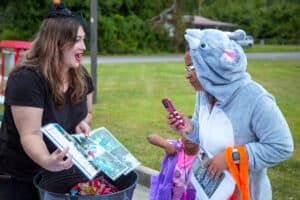
At the tour locations and during the Town Hall, Back Bay offered postcards that attendees could send to Biloxi’s mayor, encouraging the development of an overnight homeless shelter. Back Bay also is forming new partnerships with various local groups and community leaders in order to increase advocacy among residents of Biloxi and raise the necessary funds to build the emergency overnight shelters. Each emergency shelter would cost approximately $5,000 to build, and Back Bay’s vision is to develop multiple small communities, in order to make each one manageable so that services won’t get overwhelmed.
The presence of Back Bay Mission in Biloxi, Miss., changes lives, both in its Gulf Coast community and across the country, thanks to the people who volunteer their time at Back Bay and return to their local communities inspired to foster change. The Tiny Bedroom Tour and Town Hall on Homelessness were next steps in Back Bay’s work to strengthen neighborhoods, seek justice, and transform lives.
“It is our hope that we inspired those in attendance to voice their support and to act,” Skrmetti said. “We want to continue to educate, enlighten, and encourage as many people as possible — from all walks of life — to get involved because this issue is bigger than any one person or idea.”
Join Our Mailing LIst
"*" indicates required fields
Follow on Facebook
Denise Buck to Succeed Campbell as IFM CEO - CHHSM
www.chhsm.org
As IFM Community Medicine (IFM) Founder and CEO David Campbell M.D. plans to retire mid-year, his successor, Denise Buck M.D., has started working full-time with IFM in St. Louis. Before assuming this...